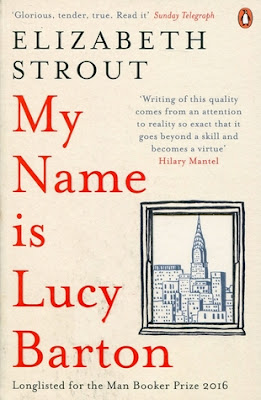193 Pages
Publisher: Penguin
Book Club Read
Blurb
Lucy Barton is recovering slowly from what should have been a simple operation. Her mother, to whom she hasn't spoken for many years, comes to see her. Her unexpected visit forces Lucy to confront the tension and longing that have informed every aspect of her life: her impoverished childhood in Amgash, Illinois, her escape to New York and her desire to become a writer, her faltering marriage, her love for her two daughters.
Knitting this powerful narrative together is the brilliant storytelling voice
of Lucy herself: keenly observant, deeply human, and truly unforgettable.
In My Name Is Lucy Barton, one of America's finest writers
shows how a simple hospital visit illuminates the most tender relationship of
all-the one between mother and daughter.
Review
My Name is Lucy Barton was a fascinating read. For the longest time, I wasn’t sure exactly what I was reading. At first, the story felt fragmented and confused; it went back and forth in time and since it was told in short paragraphs and chapters, it initially also felt incomplete.
This improved as I got further into the story, though. Or maybe, my perception of it changed once I recognised that the story was told the way our thought processes work; rarely linear and often jumping from time to time and topic to topic.
As the blurb states, this is a tale of a woman who has more or less completely cut herself off from her impoverished and often cruel childhood. But while it is possible to take oneself away from a situation, it is much harder to separate ourselves from the person who experienced that situation. While Lucy is in hospital, she has plenty of time to contemplate her life, who she is, and how she relates to her life and the people she has encountered. Her mother’s visit, which is completely out of character for the mother Lucy remembers, adds new angles to Lucy’s memories as she discovers that it is impossible to leave yourself in the past.
Where I disagree with the blurb, or rather, where I feel the blurb is incomplete is where it implies that the whole story is about the mother-daughter relationship. To me this was the story about Lucy discovering who she is, both because of and despite her fractious relationship with her past and family. It is only through reassessing what has gone before that she can move ahead and arrive at the point where she can say “My name is Lucy Barton” and fully (or as fully as any of us ever can) understand what that means.
My final thought about this book is that I had to remind myself more than once that I was reading a novel, a work of fiction, and not a memoir. I haven’t decided yet whether that is a pro or a con. 😊

